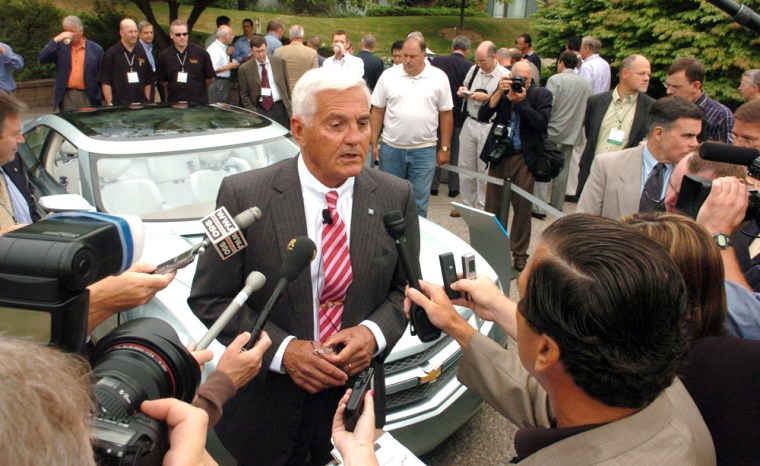General Motors Corp. has signed an agreement with a battery maker that could propel it ahead of Toyota Motor Corp. in the race to bring plug-in hybrid and electric cars to market, a top company official said Thursday.
A123 Systems Inc., based in Watertown, Mass., already produces millions of nanophosphate lithium-ion batteries for use in cordless power tools, and it plans to apply the technology to automobiles.
GM Vice Chairman Bob Lutz said the deal, coupled with a published report that Toyota Motor Corp. would delay launches of lithium-ion battery powered hybrids for up to two years, could give GM the lead in bringing the new clean technology to market.
“I think that our No. 1 competitor has some problems with their technology, and I do think that it very definitely opens a window of opportunity for us to be first to market with a genuine plug-in hybrid,” Lutz said at an automotive industry conference in Traverse City where the battery deal was announced.
The Wall Street Journal, citing people familiar with Toyota strategy that it didn’t name, reported Thursday that problems with lithium-ion technology forced Toyota to back away from plans to roll out the vehicles between 2008 and 2010.
Toyota spokesman John McCandless said the company does not comment on its product plans, but he disagreed that the developments give GM an edge.
“No one can leap ahead of anybody until the products get to market,” McCandless said.
Lutz said the lithium-ion battery being discussed by GM is safer and manages heat better than the technology Toyota was using.
He also hopes to be first to market with a pure electric vehicle that has a piston engine as an emergency backup, similar to the Chevrolet Volt prototype that the company unveiled at the North American International Auto Show in Detroit in January.
A123 expects to have the batteries, which would be flat and similar in appearance but larger than those that power cell phones, ready for GM to test in vehicles by October. GM still hopes to have electrically powered vehicles on the market by the end of 2010.
David Vieau, A123’s president and chief executive, said the technology can be moved from power tools to plug-in hybrid and electric vehicles.
“What you have to do now is put it in a vehicle” to test its thermal properties and see how it stands up to shock and vibration in a car, Vieau said.
Current hybrids, such as the hot-selling Toyota Prius, use nickel-metal-hydride batteries, which are larger than lithium-ion systems. The smaller lithium-ion systems let automakers pack more electric power into a smaller space.
Toyota’s delay was caused by safety problems with the lithium-ion technology, according to the Journal. The newspaper said Toyota was working with lithium-cobalt-oxide technology, which has problems with overheating similar to those that surfaced in Sony laptop computers.
A123 provides batteries made in China for Black & Decker and DeWalt power tools, and plans to develop a flat, rectangular battery for use by GM, Vieau said. The companies expect the batteries to have a life of 10 years with more than 7,000 charge cycles.
GM hopes its Chevrolet Volt prototype will have a range of 40 miles powered by its electric motor, eliminating trips to the gas station for those with shorter commutes.
The Volt would have a small piston engine on board to recharge the battery, extending the car’s range.
Earlier this year, GM signed two battery development contracts with Compact Power Inc. of Troy, Mich., and Frankfurt, Germany-based Continental Automotive Systems.
Compact Power will develop battery cells with its parent, LG Chem of Korea. Continental will use cells being developed jointly by GM and A123.
Lutz said that despite the setback Toyota is not out of the race.
“Never discount Toyota. They’re extremely smart people,” he said.
